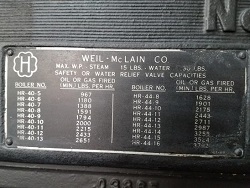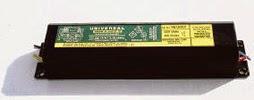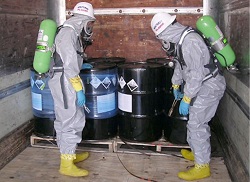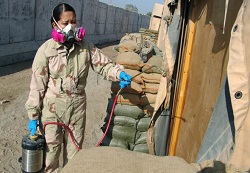Alert: DMAVA offices are closed Wednesday, 3/7/18, due to inclement weather conditions.
(Close Alert)
Compliance
On This Page:
Introduction
~Dedicated to strict adherence to all federal, state and local laws and regulations at all NJARNG sites~
All NJARNG facilities must comply with applicable federal, state, and local laws. Regulators must be permitted to enter and inspect each facility as necessary as a part of the adherence procedure. The Environmental Performance Assessment System (EPAS) serves as the guideline for monitoring environmental compliance at NJARNG facilities. Facilities found to be out of compliance with an applicable statute at any government level are subject to large fines. The governing body may continue levying fines until the facility is brought under compliance.
NJARNG personnel formulate Installation Corrective Action Plans (ICAPs) when a facility is found to be out of compliance. These plans are audited annually by NJARNG environmental personnel in accordance with Internal Performance Assessment System (IPAS). Shop chiefs/armorers work to ensure compliance at all levels by training soldiers in compliance procedures and maintaining the records necessary to prove compliance of laws and regulations at all levels.
Air Emissions Survey

The NJARNG has formulated an air quality program in conjunction with DMAVA that complies with regulations set forth in AR 200-1. DMAVA audits all NJARNG facilities for air emissions stemming from boilers, generators, fueling stations, and paint booths in addition to the ODC monitoring requirements under the ODC Elimination Plan (ODCEP). Any equipment found to produce emissions above levels designated by the state require a permit.
PCB Containing Light Ballasts

Polychlorinated Biphenyls (PCBs) are organic chemicals consisting of carbon, hydrogen and chlorine atoms. The light ballast survey is an examination of light fixtures at each site to ensure the phase out of PCBs. Under the Toxic Substances Control Act, Section 8 (b), the use and importation of certain harmful chemical substances has been banned since 1976. The act has since been updated to include over 85,000 chemical substances. In National Guard sites, magnetic light ballasts containing PCBs are required to be replaced by electronic ballasts or LED’s. For facilities with PCB light ballasts, Facility Managers should inspect the ballasts to ensure they are properly marked and labeled and, if necessary, tested.
Hazardous Waste Management

The program establishes procedures, which enable the DMAVA to track all hazardous waste from generation to disposal and comply with annual reporting, recordkeeping, and training requirements. Most NJARNG facilities are Conditionally Exempt Small Quantity Generators (CESQGs). In order to maintain CESQG status, each facility must not generate more than 220 lbs. of hazardous waste or 2.2 lbs. of acute hazardous waste per calendar month. Exceeding these thresholds will put the facility into the small quantity generator (SQG) or Large Quantity Generator (LQG) status, which have additional recordkeeping and reporting requirements. Every effort should be made to recycle and implement waste reduction procedures.
Pest Management

The New Jersey Army National Guard (NJARNG) is responsible for integrated pest management (IPM) at its facilities. The IPM Program consists of the use of both chemical and non-chemical control techniques to achieve effective pest management with minimal environmental contamination. The Federal Insecticide, Fungicide and Rodenticide Act (FIFRA) ensures that all pesticide or herbicide applications on any NJARNG property will be made by certified applicators only, either contractor or NJARNG personnel. Pesticides and herbicides used on NJARNG property must be listed on the Armed Forces Pest Management Board’s (AFPMB) Standard Pesticides List and approved by the NJARNG IPM Coordinator (IPMC).